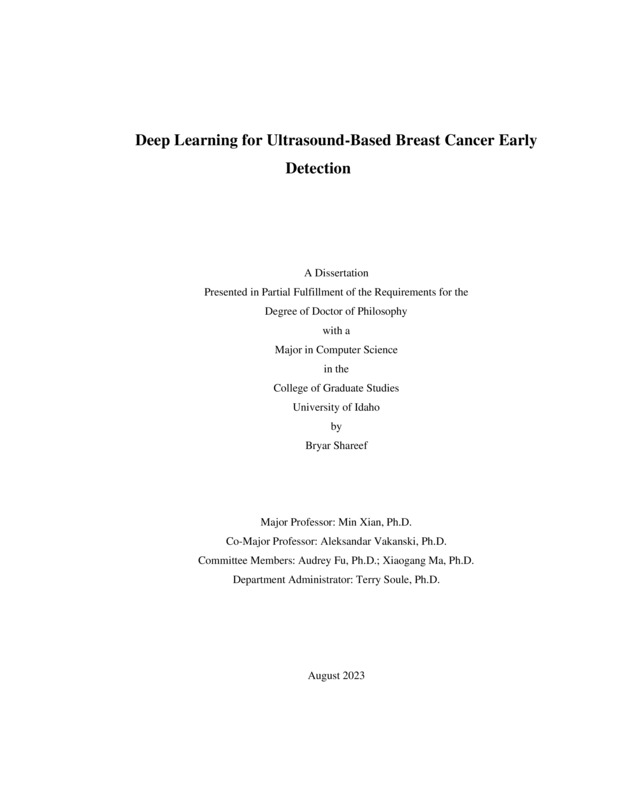Deep Learning for Ultrasound-based Breast Cancer Early Detection
Shareef, Bryar Mustafa. (2023-08). Deep Learning for Ultrasound-based Breast Cancer Early Detection. Theses and Dissertations Collection, University of Idaho Library Digital Collections. https://www.lib.uidaho.edu/digital/etd/items/shareef_idaho_0089e_12686.html
- Title:
- Deep Learning for Ultrasound-based Breast Cancer Early Detection
- Author:
- Shareef, Bryar Mustafa
- Date:
- 2023-08
- Keywords:
- Biomedical Image Analysis Breast Cancer Early Detection Computer Aided Diagnosis (CAD) Deep Learning Machine Learning Ultrasound Images
- Program:
- Computer Science
- Subject Category:
- Computer science; Artificial intelligence; Computer science
- Abstract:
-
Breast cancer is a pervasive health issue that affects millions of women worldwide. Early detection of breast cancer is crucial for reducing mortality rates and improving patient prognosis. By identifying cancer at an early stage, treatment options can be initiated promptly, leading to more successful outcomes. Breast ultrasound imaging is a valuable tool in the early detection of breast cancer. It offers several advantages, including painless and noninvasive imaging, absence of ionizing radiation, and affordability. Ultrasound imaging provides detailed visualization of breast tissue, allowing healthcare professionals to identify suspicious lesions, and assess tumor characteristics. Moreover, it is particularly effective in evaluating dense breast tissue, which may pose challenges for other modalities such as mammography. Despite its advantages, the interpretation of breast ultrasound images presents certain challenges. One of the major difficulties is the presence of speckle noise, which can obscure subtle abnormalities and make accurate tumor identification challenging. Additionally, variations in image quality, tumor shapes, and sizes further complicate the analysis. Computer-aided diagnosis (CAD) systems have emerged as crucial tools in breast cancer detection and diagnosis. These systems employ sophisticated algorithms and deep learning techniques to assist healthcare professionals in analyzing breast ultrasound images. CAD systems can aid in tumor segmentation, feature extraction, and quantification, thereby enhancing diagnostic accuracy and efficiency. By leveraging the power of artificial intelligence, CAD systems can assist in early cancer detection, reduce false-positive rates, and improve overall patient care.In this dissertation, I built several deep learning approaches to enhance breast cancer early detection using ultrasound image. First, I proposed two novel deep learning approaches, STAN and ESTAN, to detecting and segment small breast tumors. STAN addresses the challenges posed by speckle noise, poor image quality, and variable tumor shapes and sizes in breast ultrasound images. A multiscale feature extraction architecture was proposed to learn and fuse context information at different scales. ESTAN introduces a further improvement to the segmentation of small tumors in breast ultrasound images. Building upon the STAN network, the ESTAN model incorporates additional enhancements to address the aforementioned challenges. The model designed a novel architecture by incorporating breast anatomy to the design of the deep learning model. Second, I built a benchmark for breast ultrasound image classification. This study introduces a divers benchmark dataset and evaluation framework specifically designed for breast ultrasound image classification. In addition, we proposed a comprehensive evaluation methodology that incorporates multiple performance metrics and compares the effectiveness of different classification algorithms. The benchmark dataset and evaluation framework serve as valuable resources for researchers and practitioners, facilitating the development and assessment of robust classification models. In addition, we proposed a novel multitask learning approach to perform breast ultrasound image classification and segmentation simultaneously. Finally, I proposed a hybrid multitask CNN-Transformer network for breast ultrasound tumor Classification. The proposed approach combines the strengths of convolutional neural networks (CNNs) and transformer networks to capture both local and global information effectively. The network is trained using a multitask learning framework, simultaneously performing tumor classification and segmentation.
- Description:
- doctoral, Ph.D., Computer Science -- University of Idaho - College of Graduate Studies, 2023-08
- Major Professor:
- Xian, Min; Vakanski, Aleksandar
- Committee:
- Fu, Audrey; Ma, Xiaogang; Soule, Terence
- Defense Date:
- 2023-08
- Identifier:
- Shareef_idaho_0089E_12686
- Type:
- Text
- Format Original:
- Format:
- application/pdf
- Rights:
- In Copyright - Educational Use Permitted. For more information, please contact University of Idaho Library Special Collections and Archives Department at libspec@uidaho.edu.
- Standardized Rights:
- http://rightsstatements.org/vocab/InC-EDU/1.0/

